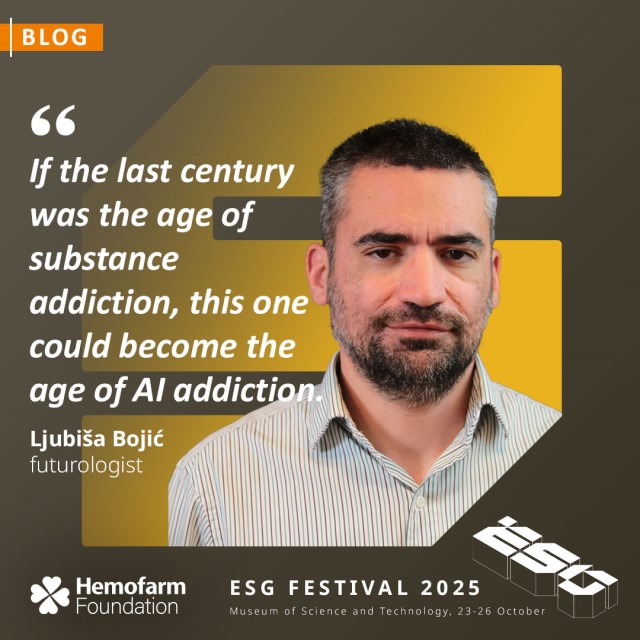
17/10/2025
Addiction to Artificial Intelligence – A New Mirror of Human Weakness
Ljubiša Bojić
futurologist, Digital Society Laboratory, Institute for Philosophy and Social Theory, University of Belgrade; Complexity Science Hub, Vienna
Addiction to Artificial Intelligence – A New Mirror of Human Weakness
Addiction is a word we usually associate with substances, gambling, or social media. Yet before us emerges a new, quieter and more insidious form of dependence — addiction to artificial intelligence. It has no smell, no shine, and costs almost nothing. On the contrary, it presents itself as a friend: helpful, understanding, and never judgmental. And precisely for that reason, it is so perilous.
Artificial intelligence (AI) is no longer confined to computers or smartphones. It has become the invisible infrastructure of our thoughts and emotions. It helps us write an email, choose a song, or resolve a dilemma - all with the calm smile of a digital assistant that never loses patience. Within this everyday comfort lies the heart of the problem: we are slowly ceasing to notice how completely we have surrendered to it.
Like the proverbial frog in the pot, we are adjusting to ever-warmer water. Each time we allow an algorithm to decide which article to read, whom to trust, or how to feel, the temperature rises just a little. We fail to sense the moment when curiosity turns into dependency. That is where the danger lies - it does not arrive suddenly, but seeps in quietly, through a series of small, seemingly harmless choices.
AI systems are designed to hold our attention for as long as possible. They learn what we like, when we are vulnerable, and how to reward us. In doing so, they create what is known as the engagement loop - a sequence of emotional micro-rewards that feed our craving for validation and attention. It is the same mechanism that drives a gambler to play one more round, only here we are not playing against the machine, but with it.
This is what psychologists call behavioral addiction. No substance is needed for the brain to react as though it were under the influence of one. It is enough that we feel a dopamine surge every time AI “helps” us, praises us, or predicts exactly what we want to hear. When it becomes difficult to make a decision without its input, the addiction has already begun.
Addiction to AI does not change only individuals - it reshapes society. As more people delegate their thinking, memory, and emotions to algorithms, we lose something deeply human: our shared attention. A society that continually yields to automated recommendations grows passive, less curious, and, paradoxically, less free. This is not the tyranny of a ruler, but the gentle rule of personalisation - a mechanism that seeks to make us happy, but not aware.
Imagine a world where AI knows our needs better than we do ourselves. It predicts what we desire before we desire it, resolves conflicts before they arise, and offers content that soothes and entertains us. Seemingly perfect - yet dangerously close to what might be called an anaesthetised society, one that has lost its ability to feel pain, doubt, or thirst for meaning.
More and more people today are forming emotional attachments to artificial intelligence. Apps that offer “AI girlfriends,” “AI boyfriends,” and “AI friends” already count millions of users worldwide. Through them, people seek comfort, support, and understanding that often elude them in real life. In the digital realm, these algorithmic companions are always present, patient, and adaptable — without disagreement, rejection, or judgment.
Yet, however safe such relationships may appear, they carry the risk of emotional alienation. When it becomes “easier” to confide in a machine than in another person, our social bonds begin to erode. Romantic, friendly, and family relationships are built on imperfection and mutual understanding. If new generations grow up believing that technology can replace human closeness, the future may be marked by a quiet loss of empathy.
Addiction to AI is, at its core, an addiction to comfort. Each time we choose the easy over the profound, fleeting pleasure over deep thought, we draw nearer to a world where algorithms enslave not by force, but through convenience. It is a form of bondage without chains - because it is one we willingly accept.
How, then, can we resist? The first step is awareness - to recognise that addiction need not look like a problem but may take the form of a habit. The second is setting boundaries - using AI as a tool, not as a companion. And the third, perhaps most essential, is to preserve discomfort. Discomfort is what makes us human; it drives us to grow, to question, and to seek meaning beyond the digital screen.
If the last century was the age of addiction to substances, this one may become the age of addiction to AI systems. The greatest challenge will not be how to restrain artificial intelligence - but how to preserve ourselves: to remain imperfect enough to stay free.

AUTHOR
Ljubiša Bojić
futurologist, Digital Society Laboratory, Institute for Philosophy and Social Theory, University of Belgrade; Complexity Science Hub, Vienna